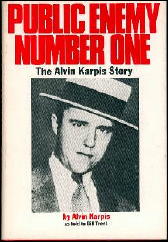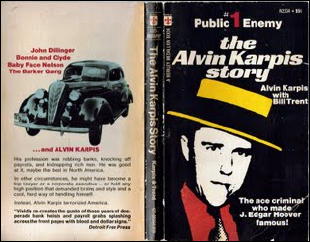Wed 30 Sep 2009
A Review by Dan Stumpf: ALVIN KARPIS & BILL TRENT – Public Enemy Number One.
Posted by Steve under Reviews , True crime[2] Comments
ALVIN KARPIS & BILL TRENT – Public Enemy Number One. McClelland & Stewart, Canada, hardcover, 1971; Coward McCann & Geoghegan, US, hc, 1971, as The Alvin Karpis Story. Paperback reprint: Berkley, 1972.

While authors like Raymond Chandler were practicing violent crime in the pulps, other folks were doing it in real life, as witness this book by Alvin Karpis and Bill Trent. For those who may not remember, Alvin “Creepy” Karpis was one of the most notorious of the rural bank robbers roaming the mid-west from 1931 to 1935,and in a roster that induded John Dillinger, Bonnie & Clyde, Baby Face Nelson and Pretty Boy Floyd, “Creepy” Karpis was, one of the sharpest and most successful.
He was also the only one to survive and write (or ghost-write) his memoirs, and I have to say he and Bill Trent make a good job of it. Karpis/Trent can detail a bank robbery and car chase with the staccato skill of Richard Stark or Dan J. Marlowe, and he avoids any tendency to glamorize or mitigate his crime; in this narrative, he’s just a professional thief, doing what he does well.
Karpis also avoids writing anything that might jump up and bite him in the ass. He and his gang were responsible for a goodly number of deliberate murders and incidental killings, but Karpis doesn’t talk about any of them. When he does go into detail about a killing, he usually ascribes it to someone else (usually “Doc” Barker) though Karpis seems to remember a whole lot of incidental details for a guy who wasn’t there at the time.

Just as much fun as the gory details, though, is Karpis’ gently cynical view of life, crime and law enforcement.
He makes no excuses for himself, and builds no illusions about his co-workers. Bonnie and Clyde he describes as being mentally sub-normal, and though “Ma” Barker was generally depicted in those days as a criminal mastermind who spawned and directed a gang of killers, according to Karpis, “She couldn’t organize breakfast. She knew where we were getting the money, she knew what we did, but whenever we sat down to plan a job, we sent her out to the movies.”
I also got a kick out of Karpis’ description of his arrest by J. Edgar Hoover — the only major collar Hoover ever made personally, and according to Karpis, something of a comic opera. Public Enemy is less critical of Hoover than later books would be, but somehow the bankrobber’s casual dismissal of him as a political hack is even more damning than some of the full-blown indictments that followed. It’s as if a real man of action just had no time for a power-hungry poseur like Hoover.
September 30th, 2009 at 9:18 pm
According to some accounts other than Karpis the Hoover arrest was indeed a circus. The version most often told has Hoover and his men lost and not knowing where the police station was so Karpis had to tell them where to take him.
Don’t know if I’d call Karpis a “man of action” so much as a sociopath, never could develop much admiration for him or his ilk, but compared to Hoover even some sociopaths may have been preferable.
October 23rd, 2009 at 5:29 pm
I’ve done a great deal of research on Karpis and his connections to the Garrettsville train robbery, he seems to be overwhelmingly regarded by lawmen and outlaw alike, as the smartest of the depression era outlaws.